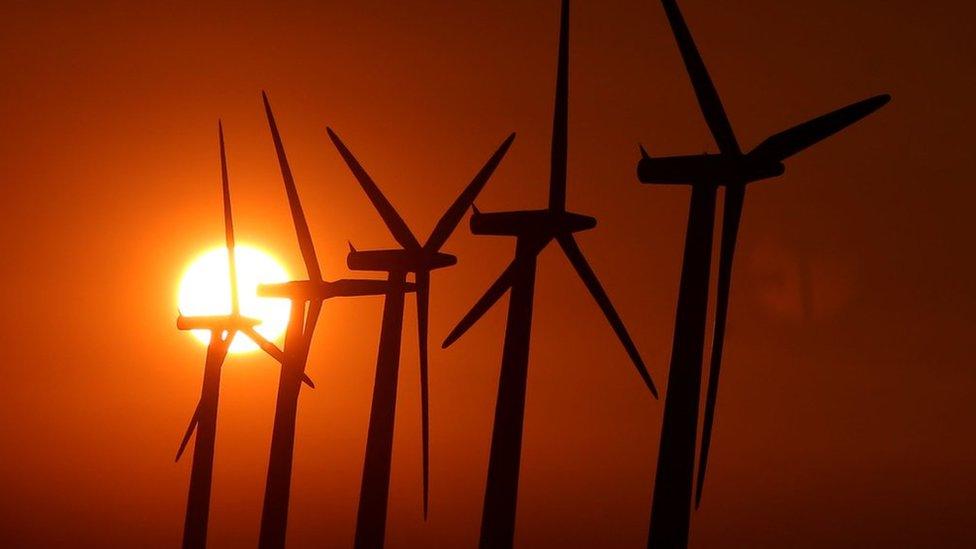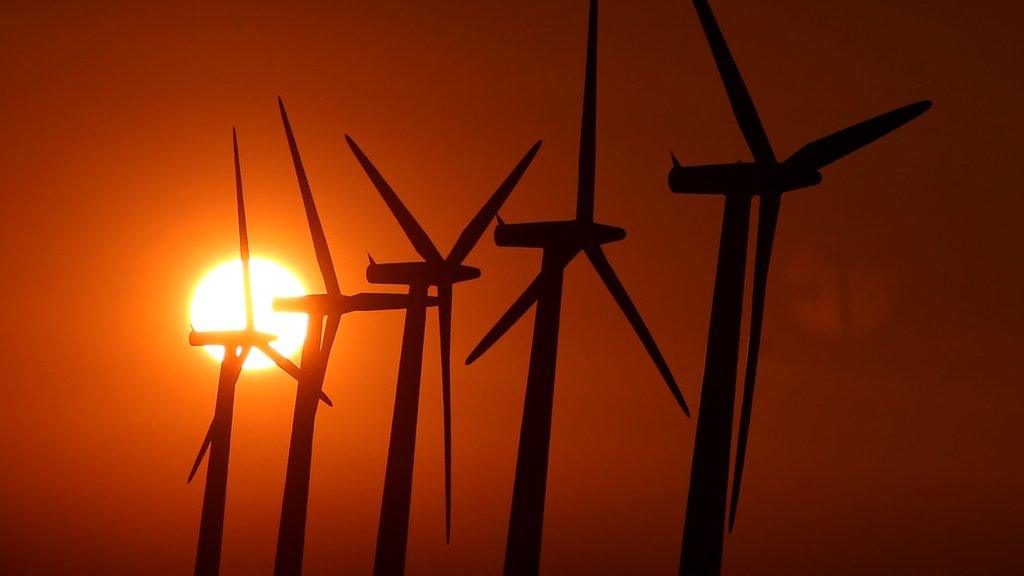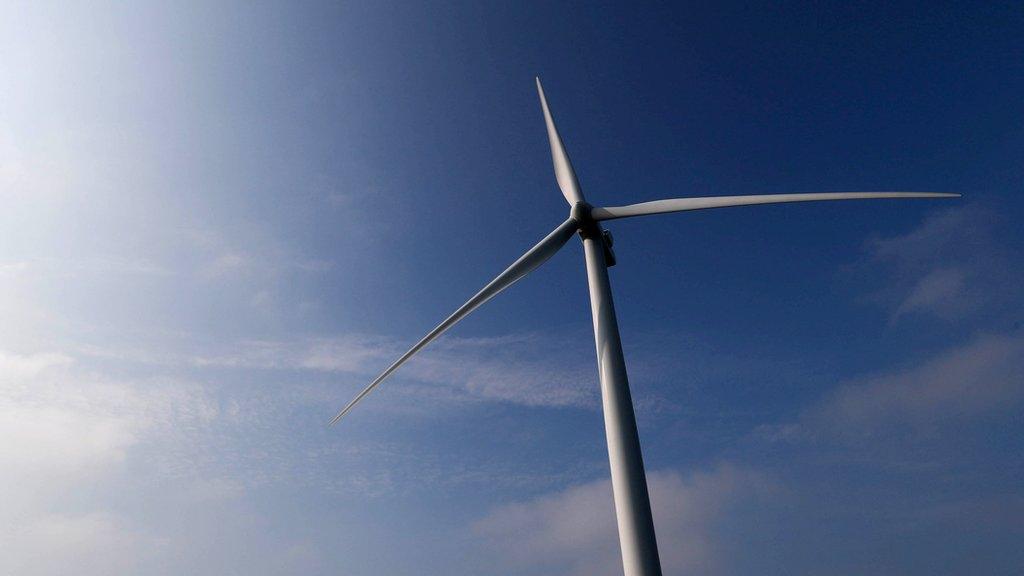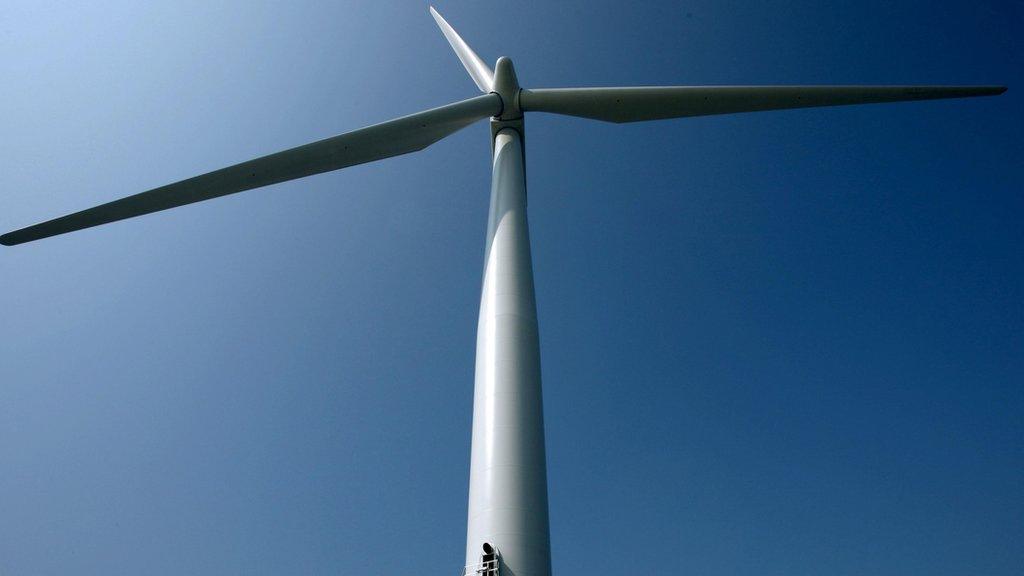Ofgem 'unable to approve' subsea cables from Shetland and the Western Isles
- Published

The cables would export electricity from wind farms
Energy regulator Ofgem has been "unable to approve" plans for two huge subsea cables to take energy from the Scottish islands to the mainland.
The transmission links from Shetland and the Western Isles were proposed to connect planned new wind farms on the islands to the national grid.
Ofgem said the failure of the projects to secure subsidies meant it was not able to approve the subsea links.
However the energy regulator said it would welcome "revised proposals".
In March, Ofgem had said it was minded to approve the Shetland proposals from Scottish and Southern Energy Networks (SSEN).
The regulator said in a statement: "Ofgem is unable to approve a proposal by Scottish and Southern Energy Networks (SSEN) to build a 600MW subsea electricity transmission link from Shetland to mainland Scotland.
"For the Western Isles, Ofgem is unable to approve SSEN's proposal to build a 600MW transmission link."
'Lowest cost'
Ofgem added: "Ofgem's committed to helping deliver the most effective and fastest route to a net zero emissions economy at the lowest cost to consumers.
"It encourages SSEN to submit revised proposals for both transmission links, including establishing more certainty for consumers that the wind farm projects will go ahead."
SSEN Transmission's managing director Rob McDonald said: "We welcome Ofgem's continued commitment to provide a way forward for both the Shetland and Western Isles transmission links.
"It is now critical that all parties work together to provide the information Ofgem require at the earliest possible opportunity.
"Ultimately, a successful outcome will depend on renewable developers on both island groups demonstrating that sufficient generation will progress to underpin the transmission investment cases."

Analysis by Douglas Fraser, BBC Scotland business and economy editor
Chicken or egg? If you lay chunky subsea cables between Lewis and the mainland, and Shetland and the mainland, you open the door to developing a lot of onshore wind power projects, plus offshore potential.
But until you get the cables, there's an unwillingness to commit to the wind turbines, or to grant them Contracts for Difference (a subsidy if the market price of power falls below an agreed floor price).
Given the amount of island wind, and the land area on these islands, a lot of potential for wind power hangs on unlocking this dilemma.
Ofgem is charged with balancing several viewpoints, including the pressure to expand the UK's roll-out of renewable energy. But it also has to represent the customer interest, in that the cost of such projects is loaded on to household and business bills.
Put more capacity in the subsea cables than is justified by the power sources consented to supply them, and we all have to pay a share of that wasted capacity.
However, the energy regulator does not want to be seen as the barrier to green energy developments - it seems to be putting pressure on SSE to downgrade the capacity of its cables, to reduce costs, and then to resubmit plans.
A similar problem of chicken and egg applies in the case of electric charging points. Scottish Power wants to re-orient its distribution cabling and to invest in charging points where there are currently few owners of plug-in vehicles.
One of its concerns is that the market will support charging points in well-off areas, but not do so in poorer ones, leaving people in the latter without the option of electric vehicles after the point when they become relatively cheaper.
Ofgem has been unhelpful to Scottish Power's plans, knocking back an application to invest £42m in the charging points. It has said it won't approve projects incompatible with reaching net zero emissions by 2050 (the UK government target) but nor will it sanction plans that could lead to a dead end. And on electric vehicle charging, it says there is huge uncertainty about how much will be required, or where.
So the Glasgow-based utility company is pushing ahead with investment on a scaled down project without Ofgem's approval. It's an application of the saying from the 1989 fantasy movie Field of Dreams, in which a baseball pitch is built in a Midwest cornfield, in the hope that the ghosts of great players would return to play there: "If you build it, he will come."
- Published19 March 2019

- Published14 August 2018

- Published12 March 2018
